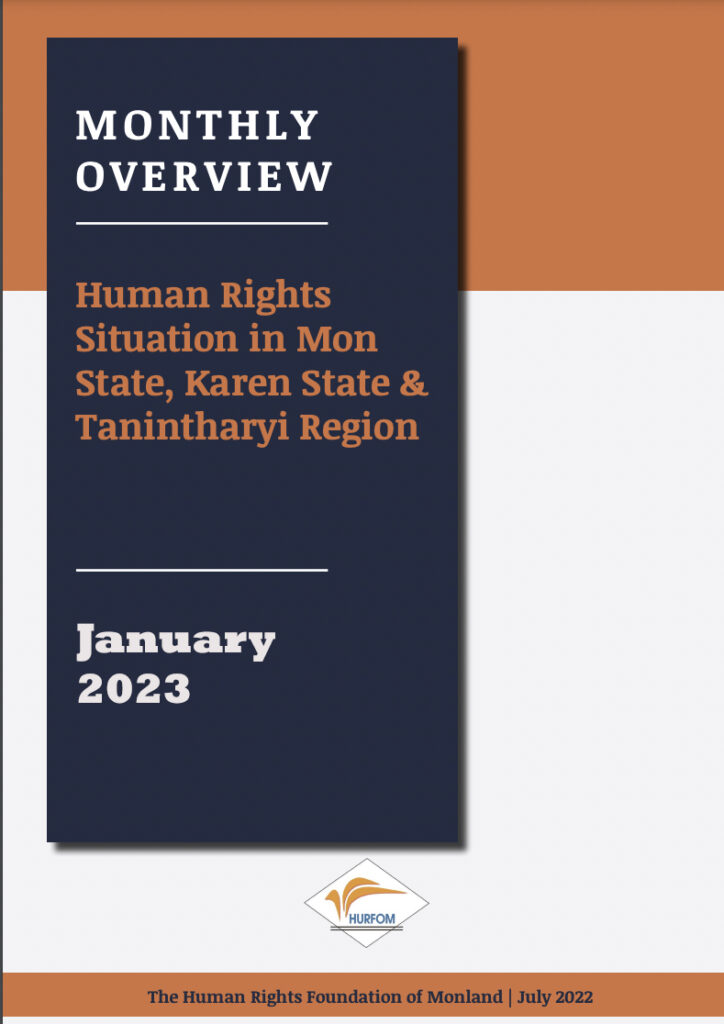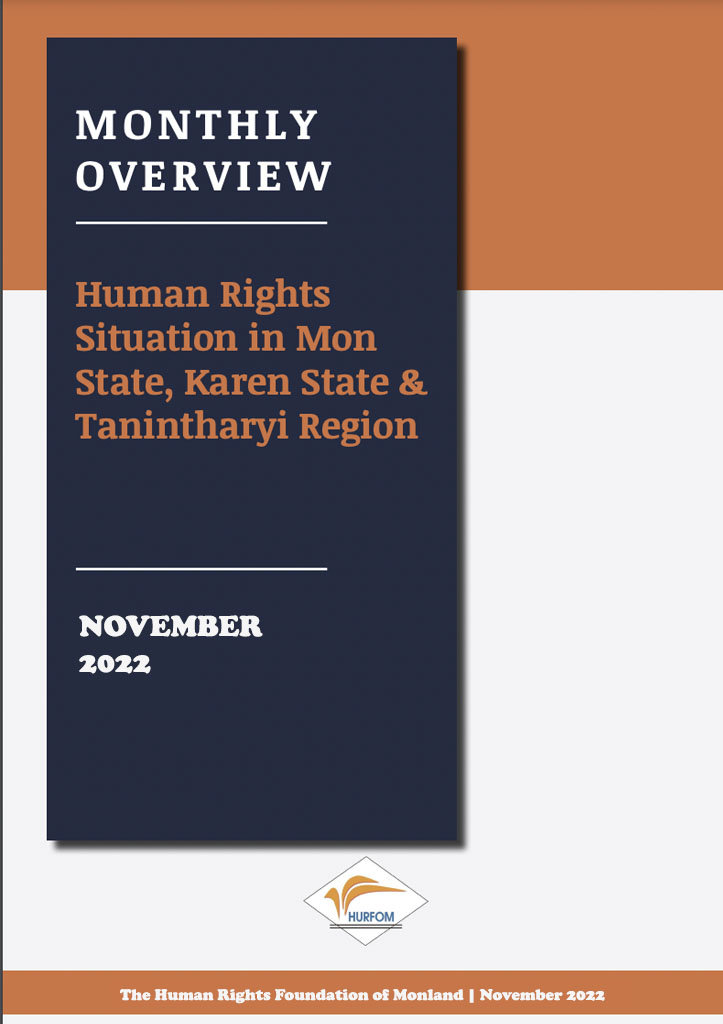Monthly Overview: International Engagement with the Military Junta, Including United Nations Affiliates, Undermines the Pro-Democracy Movement
September 4, 2023
HURFOM
While the human rights situation in Burma continues to deteriorate, civil society organizations, including the Human Rights Foundation of Monland (HURFOM), remain committed to the success of the pro-democracy movement. Engagement with local communities, respected leaders and refugee-led organizations and committees are critical to ensuring the response to the humanitarian crisis is rooted in an approach of ‘do no harm.’ This effort can be strengthened with the international community’s support, which can allocate funds and resources to displaced people and conflict-affected refugees.
Further, the Commanders of the junta have repeatedly issued orders that threaten civilian safety. The situation has worsened in Mon State, Karen State, and the Tanintharyi region, where HURFOM fieldworkers report daily abuses. Indiscriminate firing displaces families and significantly undermines their survival and access to education and work.
Read moreMonthly Overview: The first Anniversary of the Execution of Four Political Prisoners and Ongoing Arrests and Death Sentences Demands Immediate Action as Impunity Thrives in Southeastern Burma and Nationwide
August 2, 2023
Human Rights Foundation of Monland (HURFOM)
Escalating violence in Southeastern Burma remains a threat to the survival of civilians. Indiscriminate firing, forced relocation, destruction of property, arbitrary arrest, and unlawful detainment are among the human rights violations that continue destabilizing the country. The soldiers of the Burma Army perpetrate these crimes with impunity. The silence and lack of action beyond condemnation by the international community only embolden them to commit more atrocity crimes. Civilians have suffered immensely as they are forced to flee their homes and seek safety and shelter wherever they can.
Read moreMonthly Overview: Widespread Attacks Against Civilians in Southeastern Burma by the Junta Displace Thousands
July 3, 2023
Human Rights Foundation of Monland (HURFOM)
Situation Overview
The safety and well-being of civilians in Burma remain under attack due to unrelenting attacks by the military junta. Protection of those at risk, including the most vulnerable, must take precedence. Calls from civil society organizations, including the Human Rights Foundation of Monland (HURFOM), are adamant that pro-democracy forces on the ground must be supported. This includes trust and cooperation with local organizations to facilitate cross-border humanitarian assistance.
Despite the numerous reports and ongoing human rights documentation providing evidence of the junta’s widespread crimes, the international community remains slow to act with the urgency required. It was announced this month that the UN Special Envoy to Myanmar, Noeleen Heyzer, is leaving her post after a twenty-month posting. Ultimately, she was unsuccessful in her bid to halt the offensives being perpetrated by the junta.
Read moreMonthly Overview: While Cyclone Mocha Threatened to Destabilise Civilian Livelihoods and Safety, the Military Junta Continued to Deploy Attacks
May 30, 2023
Human Rights Foundation of Monland (HURFOM)
In the wake of Cyclone Mocha, civilians in Burma braced for the worst as the powerful storm threatened lives and caused widespread destruction. While local emergency response teams worked to put preventative measures and safety protocols in place, the military junta continued to bombard civilians with air and ground attacks. Their immense suffering, even in the wake of a natural disaster, did not deter the regime from their attacks.
The cyclone has affected the whole region, and yet days into the first week of May, the military junta deployed a series of targeted airstrikes on civilians in Southeastern Burma. A joint statement with the Karen Human Rights Group and the Karen Peace Support Network condemned attacks on 10 May by soldiers from Light Infantry Battalion (LIB) #599 under Military Operations Command (MOC) #13, together with other junta-backed infantry divisions and battalions. The attacks killed nearly 20 people, including several children.
Read moreMonthly Overview: New Year ‘Thingyan’ Activities Are Marred by Violence, Military Impunity by the Junta
May 2, 2023
Human Rights Foundation of Monland | April 2023
Every year for decades, the Burmese New Year has been celebrated in April. Once a celebration inviting festivities and tradition is now profoundly darkened by the cruel actions of the junta. Since the attempted coup on 1 February 2021, the people of Burma have rejected the regime’s pursuits to defend the realities on the ground as ‘normal.’ One of the ways the military has tried to show its legitimacy is by propping up holidays such as Thingyan. In response, civilians have boycotted their events and participated in ‘Silent Strikes’ to demonstrate the ongoing rejection of the military.
Read moreMonthly Overview: The Military Junta Continues to Use Gendered Violence as a Tool to Suppress Dissent and Exploit Fear into Young Women and Children
April 3, 2023
Human Rights Foundation of Monland
International Women’s Day was recognized on 8 March. In Burma, women face ongoing threats to their lives as the Burma Army increases its armed presence in civilian areas. While women human rights defenders were bravely spreading awareness and solidarity about the importance of 8 March, the regime continued to oppress women violently. Many of those detained this month are women and young girls who have been abducted on baseless charges. Following a series of arrests on 7 March that included women, all were accused of supporting the armed resistance movement: “Everyone knows that they are innocent,” said a local villager.
Read moreMonthly Overview: Martial Law and the Devastating Toll on Civilians in Southeastern Burma as the Junta Continues to Commit Human Rights Violations With Impunity | February 2023
March 1, 2023
The third anniversary of the failed coup was commemorated on 1 February. To mark the day, the Human Rights Foundation of Monland (HURFOM) called upon the international community to use their platforms and diplomatic will to change the course of history. It begins with measures and concrete steps that prosecute Min Aung Hlaing and end his legacy of tyranny.
Read moreMonthly Overview: Airstrikes in Southeastern Burma Kill and Injure Civilians While Forcing Thousands to Flee as the Burma Army Prepares for their Sham 2023 Elections | January 2023
February 2, 2023
HURFOM: The first month of the year in Southeastern Burma and country-wide proved equally disastrous. Despite the multiple calls to the international community for action as the junta commits endless atrocities, they seemed to fall upon deaf ears. Across January 2023, the Human Rights Foundation of Monland (HURFOM) documented dozens more malicious attacks against civilians. While these crimes are occurring, the regime is shamelessly continuing with their plans to hold ‘elections’ later this year. HURFOM fieldworkers reported on early cases of civilians already being bribed to vote for the military.

The Mon State Junta Administration General Administration Department (GAD) has been conducting several meetings in each township in Mon State for all levels of Administrators to operate an accurate census and prepare for the upcoming junta-run election:
“They seem like they are preparing for the election. The Mon State junta is conducting election-related activities such as instructing each level of GAD staff to collect the numbers of the population in the whole state and training the polling station officers to hold the General Election,” said a source close to HURFOM.
On the other hand, the military-backed Union Solidarity and Development Party members are tasked by the junta to obtain the entire population of households in each ward, village, and township. The people know these elections are not credible, yet they are threatened with their lives if they do not comply with military orders. The election plans are another malicious attempt by the junta to make Burma appear like a country that has returned to normalcy in the days since the coup. The junta has targeted opposition forces and pro-democracy proponents and, once in junta custody, are tortured and killed. Defacto Head of State, Aung San Suu Kyi and President U Win Myint has been detained on baseless charges since 1 February 2021. Each faces up to several decades in prison – effectively life sentences.
Read moreMonthly Overview:
Human Rights Situation in Mon State, Karen State, and Tanintharyi Region | December 2022
January 3, 2023
Indiscriminate Firing, Mortar Shelling and Ongoing Abductions by the Military Junta Force Thousands of Civilians in Southeastern Burma to Flee
HURFOM: Over the last twelve months, the Human Rights Foundation of Monland (HURFOM) has continued to document the widespread and systematic atrocities perpetrated against innocent civilians by the Burma Army. As the year 2022 ends, HURFOM has concluded that the human rights situation has shown no improvement based on our findings and analysis. The military has resorted to violence to advance its authoritarian agenda, even at the cost of innocent lives. This includes more abductions, torture and conflict-related sexual violence.
Read moreMonthly Overview:
Human Rights Situation in Mon State, Karen State, and Tanintharyi Region | November 2022
December 1, 2022
Destruction of Property Rampant in Southeastern Burma, Ongoing Offensives Undermine Civilian Safety and Security
With 2022 coming to an end, Burma’s human rights landscape remains fractured due to the Burma Army’s constant attacks. The targeting of the civilian population has been deliberate. Patterns of their systematic and widespread atrocities are evident through airstrikes and ground attacks intentionally deployed in areas without active conflict. Their acts are part of a broader strategy by the junta to replace the support of the opposition movement with fear.
However, even nearly two years after the attempted coup, the power of the people remains unstoppable. Protests are ongoing and calls for the immediate dismantling and delegitimizing of the junta have not slowed. The bravery of human rights defenders persists even amidst moments of great uncertainty. Decades of military rule and economic turmoil have left Burma in shambles as a new generation refuses to allow a new generation to inherit the junta’s devastating policies and failure to adhere to basic human rights norms and principles.
Throughout November, the Human Rights Foundation of Monland (HURFOM) observed an increase in the number of homes the Burma Army deliberately destroyed. Extortion of local possessions and houses is being done systematically across the country. Junta forces threatened to burn villagers’ homes and launch airstrikes following any attack that injured or killed their soldiers. The junta routinely attacks villages near mix-controlled areas in Thanbyuzayat Township, Mon State. These villages are controlled by the Karen National Union (KNU) and the junta.
Read more



















































